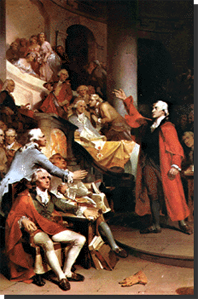Patrick Henry, one of the most successful criminal attorneys of his time, garnered a reputation as a brilliant orator after his defense of the
 natural rights of Americans against King George III’s interference with the tax laws in Virginia. He served in the Fir hellost Continental Congress, and in 1775, at the Virginia Convention, he sponsored measures for armed resistance to the British. He was a delegate to the Second Continental Congress, and then opposed the Constitution because he thought it didn’t provide sufficiently for states and individual rights. Because he was concerned about the federal government’s authority, he championed the adoption of the Bill of Rights.
natural rights of Americans against King George III’s interference with the tax laws in Virginia. He served in the Fir hellost Continental Congress, and in 1775, at the Virginia Convention, he sponsored measures for armed resistance to the British. He was a delegate to the Second Continental Congress, and then opposed the Constitution because he thought it didn’t provide sufficiently for states and individual rights. Because he was concerned about the federal government’s authority, he championed the adoption of the Bill of Rights.
Near the end of his life, he became more and more alarmed at the spread of deis thism and atheism coming from what he called France’s “godless revolution.” He served five terms as Governor of Virginia after the War. Although he was offered positions in the administrations of both Washington and Adams, he declined due to his health.
His faith was evident in his so-called “give me liberty or give me death” speech. While most of us only remember that one phrase, the speech was peppered with references to God and quotes from both the Old and New Testaments. For instance, he quotes both Jeremiah and Matthew in this paragraph:
“It is in vain, sir, to extenuate the matter. Gentlemen may cry, Peace, Peace-- but there is no peace. The war is actually begun! The next gale that sweeps from the north will bring to our ears the clash of resounding arms! Our brethren are already in the field! Why stand we here idle? What is it that gentlemen wish? What would they have? Is life so dear, or peace so sweet, as to be purchased at the price of chains and slavery? Forbid it, Almighty God! I know not what course others may take; but as for me, give me liberty or give me death!”
Toward the end of his life, he reportedly read his Bible for hours at a time. He once said to a neighbor:
"This book is worth all the books that ever were printed, and it has been my misfortune that I never found time to read it with the proper attention and feeling till lately. I trust in the mercy of heaven that it is not too late."
In a letter to his daughter dated August 20, 1796, he wrote:
“Amongst other strange things said of me, I hear it is said by the deists that I am one of the number; and indeed, that some good people think I am no Christian. This thought gives me much more pain than the appellation of Tory; because I think religion of infinitely higher importance than politics; and I find much cause to reproach myself that I have lived so long, and have given no decided and public proofs of my being a Christian. But, indeed, my dear child, this is a character which I prize far above all this world has, or can boast.”
On his death bed, Patrick Henry said:
“Doctor, I wish you to observe how real and beneficial the religion of Christ is to a man about to die....I am, however, much consoled by reflecting that the religion of Christ has, from its first appearance in the world, been attacked in vain by all the wits, philosophers, and wise ones, aided by every power of man, and its triumphs have been complete.”
On November 20, 1798, in his Last Will and Testament, Patrick Henry wrote:
“This is all the inheritance I give to my dear family. The religion of Christ will give them one which will make them rich indeed.”